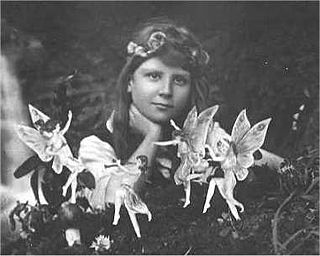Frances Wright was a writer and reformer.
Frances Wright may also refer to:
Alien primarily refers to:

The Cottingley Fairies appear in a series of five photographs taken by Elsie Wright (1901–1988) and Frances Griffiths (1907–1986), two young cousins who lived in Cottingley, near Bradford in England. In 1917, when the first two photographs were taken, Elsie was 16 years old and Frances was 9. The pictures came to the attention of writer Sir Arthur Conan Doyle, who used them to illustrate an article on fairies he had been commissioned to write for the Christmas 1920 edition of The Strand Magazine. Doyle, as a spiritualist, was enthusiastic about the photographs, and interpreted them as clear and visible evidence of psychic phenomena. Public reaction was mixed; some accepted the images as genuine, others believed that they had been faked.

Frances Wright, widely known as Fanny Wright, was a Scottish-born lecturer, writer, freethinker, feminist, utopian socialist, abolitionist, social reformer, and Epicurean philosopher, who became a US citizen in 1825. The same year, she founded the Nashoba Commune in Tennessee, as a utopian community to demonstrate how to prepare slaves for eventual emancipation, but the project lasted only five years. In the late 1820s Wright was the first woman lecturer to speak publicly before gatherings of men and women in the United States about political and social-reform issues. She advocated universal education, the emancipation of slaves, birth control, equal rights, sexual freedom, legal rights for married women, and liberal divorce laws. Wright was also vocal in her opposition to organized religion and capital punishment. The clergy and the press harshly criticized Wright's radical views. Her public lectures in the United States led to the establishment of Fanny Wright societies and her association with the Working Men's Party, organized in New York City in 1829, became so strong that its opponents called the party's slate of candidates the Fanny Wright ticket.
Wright is an occupational surname originating in England. The term 'Wright' comes from the circa 700 AD Old English word 'wryhta' or 'wyrhta', meaning worker or shaper of wood. Later it became any occupational worker, and is used as a British family name.
Richard Wright may refer to:
Billy Wright may refer to:
Joseph Wright may refer to:
Frances Howard may refer to:
Jay Wright may refer to:
Tom Wright may refer to:
Frank Wright, sometimes but not always an abbreviation of Francis Wright, may refer to:
Steven Wright is an American comedian and actor.
Comment may refer to:
Matt or Matthew Wright may refer to:
Stephen Wright may refer to:
Daniel Wright or Dan Wright may refer to:
Francis Healy or Frances Healy or variants thereof may refer to:
Frances FitzGerald may refer to:
Francis Wright may refer to:
Frances White may refer to: